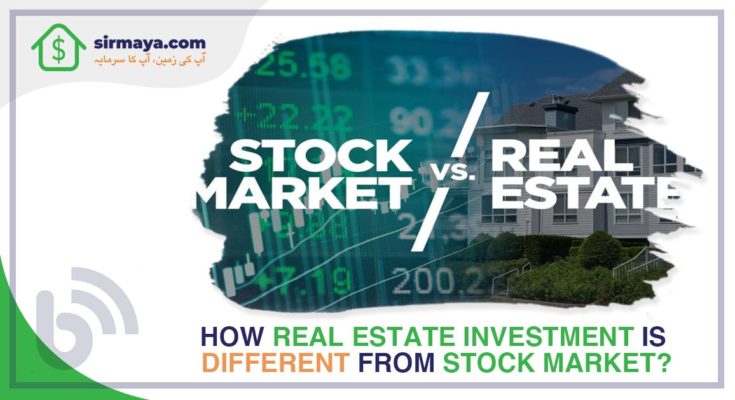In real estate Investments, you purchase a physical piece of land or property. Investing in stocks is a whole different experience. When you buy stock in a corporation, you purchase a claim to a piece of the company.
Each investment has its own set of dangers. Each month, you incur maintenance, capital, and maybe development costs when you own real estate. Physical assets, on the other hand, are less likely to lose their value than stocks.
Overview: Real Estate Investment vs. Stocks
Whether you are interested in stocks or real estate investment. It is a personal decision. It depends on your financial situation, risk tolerance, supporting goals, and investment style. It’s safe to suppose that more people invest in the stock market, probably because buying equities takes less time and money. If you want to purchase real estate, you’ll need to save and put down a significant sum of money.
When you buy stocks, you purchase a little portion of a firm. In general, there are two methods to profit from stocks: value appreciation when the company’s stock rises in value and dividends.
Investing in Real Estate
Real estate investments are more appealing to many investors since they are tangible. You have the ability to touch, feel, and investigate the property you own. Furthermore, You have greater control as the owner of the property over the value and usage of your investment than a typical investor.
There are two standard types of real estate investments: residential and commercial. All single-family units, structures for one to four families, cooperative units, and condominiums . They are considered residential real estate. Land development, home flipping, and operating as a landlord for rental purposes are all standard investment options.
Commercial real estate investments are focused on land or buildings that generate revenue and have greater start-up costs than residential real estate investments. Rental homes with five or more family units are also classified as commercial. Rent from office, and retail space leases are how most commercial real estate owners make money.
Investing in Stocks
Investing in stocks does not involve much effort on your part, aside from basic research to choose which stocks to buy. Stocks are essentially legal titles that serve as claims on a company’s profits (and maybe dividends) as they grow.
You are neither a company employee nor a participant in practically any management decisions. (Shareholders do have a say in management decisions, such as who is elected to the board of directors.) Stocks are a simpler investment in some ways, but they put you at the mercy of other people’s business acumen.
Stocks are more liquid assets than real estate. It is easier to buy & sell shares than list and sell the property. Even though you can borrow against both investments, it is easier to borrow against stocks.
Investing in Real Estate vs. Stocks
Some financial gurus believe that buying and holding stocks (and re-investing dividends) is the best long-term strategy for building wealth. Real estate, on the other hand, has fewer unpredictable fluctuations than the stock market. There are also additional tax advantages to owning and depreciating real estate assets. Both assets, on the other hand, have a demonstrated track record of earning returns over time.
Compete Risk-Free with $1000,000 in Virtual Cash
Test your trading skills first on the Demo account. Trade with the fake money. Compete with thousands of Investopedia traders & trade your way to the top! Grow the account. Practice different trading strategies so that when you’re ready to enter the real market, you’ve had the practice you need.
Cash Flow
On a monthly basis, rent from real estate can provide consistent & stable income flow. Some real estate is profitable, such as rental houses, storage sheds, apartment buildings, or strip malls. Where you pay expenditures, tenants pay rent. And you keep the difference as profit.
The cash flow generated by stock investments differs from the cash flow generated by renting out your property. You make the most of your money from stocks when you sell them in the long run. On the other hand, Dividends can be paid to investors while they still own stock. Dividends can be re-invested. If you use the funds that a company sends you for owning its stock to buy more shares, over time, you should own far more shares, which entitles you to even more cash dividends.
The bottom line:
It’s difficult to compare these two real estate and stock markets two on an apples-to-apples basis. Real estate investments, on the other hand, have just as much, if not more, return potential as stock investments. When considering the potential for the price increase. Rental income and the inherent tax benefits of real estate investing, you might expect to see some outstanding long-term returns.






I do accept as true with all the concepts you have introduced for your post. They’re really convincing and will certainly work. Nonetheless, the posts are very short for newbies. Could you please prolong them a bit from next time? Thank you for the post.
There’s definately a great deal to know about this issue.
I love all the points you’ve made.
Thanks for writing such informative Blog.
Great article thanks!
Always happy to follow new topics, thanks for your hard work. I think you manage to publish really exciting topics for your readers, that’s great. I have been reading you for a long time and will continue further. I thank the authors and editors for interesting topics. Sincerely, your reader.